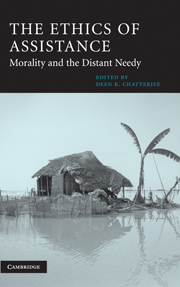Book contents
- Frontmatter
- Contents
- Notes on contributors
- Preface
- 1 Introduction
- PART I THE ETHICS OF DISTANCE
- 2 Outsiders: our obligations to those beyond our borders
- 3 Moral limits on the demands of beneficence?
- 4 The new problem of distance in morality
- 5 Absence and the unfond heart: why people are less giving than they might be
- PART II COMMUNITIES AND OBLIGATIONS
- PART III THE LAW OF PEOPLES
- PART IV RIGHTS, RESPONSIBILITIES AND INSTITUTIONAL REFORMS
- Index
2 - Outsiders: our obligations to those beyond our borders
Published online by Cambridge University Press: 05 June 2012
- Frontmatter
- Contents
- Notes on contributors
- Preface
- 1 Introduction
- PART I THE ETHICS OF DISTANCE
- 2 Outsiders: our obligations to those beyond our borders
- 3 Moral limits on the demands of beneficence?
- 4 The new problem of distance in morality
- 5 Absence and the unfond heart: why people are less giving than they might be
- PART II COMMUNITIES AND OBLIGATIONS
- PART III THE LAW OF PEOPLES
- PART IV RIGHTS, RESPONSIBILITIES AND INSTITUTIONAL REFORMS
- Index
Summary
In an article entitled “Famine, Affluence and Morality,”, first published in 1972, I argued that:
it makes no moral difference whether the person I help is a neighbor's child ten yards from me or a Bengali whose name I shall never know, ten thousand miles away
As far as I am aware, no one has disputed this claim in respect of distance per se – that is, the difference between 10 yards and 10,000 miles. Of course, the degree of certainty that we can have that our assistance will get to the right person, and will really help that person, may be affected by distance, and that can make a difference to what we ought to do, but that will depend on the particular circumstances we find ourselves in. The aspect of my claim that has been the subject of greatest philosophical dispute is the suggestion that our obligation to help a stranger is as great as our obligation to help a neighbor's child. Several critics have claimed that we have special obligations to our family, friends, neighbors and fellow-citizens. Raymond Gastil, for example, has objected that:
There is no doctrine of nonuniversalistic obligation with which Singer seriously deals. The flatness of his map of obligation and responsibility is suggested by the remark that “… unfortunately most of the major evils – poverty, overpopulation, pollution – are problems in which everyone is almost equally involved.”
- Type
- Chapter
- Information
- The Ethics of AssistanceMorality and the Distant Needy, pp. 11 - 32Publisher: Cambridge University PressPrint publication year: 2004
- 24
- Cited by



